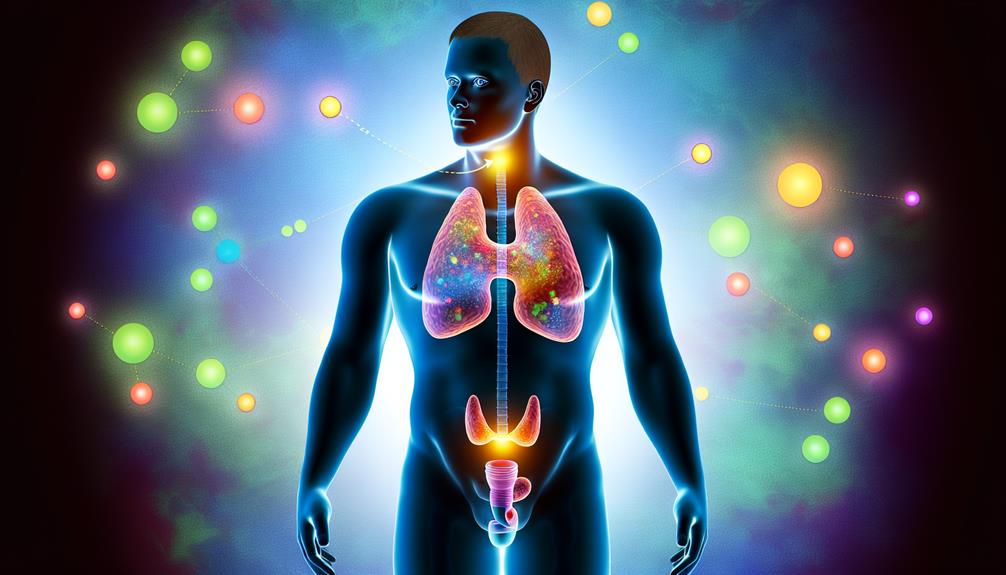I understand that thyroid health is intricately linked to hormone balance in men, primarily affecting testosterone levels. The thyroid gland produces hormones like T3 and T4, which directly influence testosterone production. When thyroid function is abnormal, men may experience low testosterone, leading to fatigue and reduced libido. Additionally, thyroid dysfunction can impact other hormones, including cortisol and insulin, creating a complex network of hormonal interactions. This imbalance can exacerbate conditions, leading to more significant health issues. By exploring more, you'll uncover effective strategies for maintaining ideal thyroid function and hormone balance.
Role of the Thyroid Gland

The thyroid gland plays an indispensable role in regulating various metabolic processes in the body, and its impact on overall health cannot be overstated. As I investigate the intricacies of thyroid function, it's clear that this butterfly-shaped gland in the neck is significant for maintaining energy levels, temperature regulation, and even mood stability. When I think about glandular health, I can't help but emphasize how interconnected the thyroid is with numerous physiological systems.
Thyroid function hinges on the production of hormones like thyroxine (T4) and triiodothyronine (T3), which directly influence metabolic rate. When these hormones are in balance, the body operates efficiently; however, any disruption can lead to a cascade of health issues. For example, hypothyroidism, characterized by insufficient hormone production, often results in fatigue, weight gain, and depression. Conversely, hyperthyroidism, marked by excessive hormone levels, can cause anxiety, weight loss, and insomnia.
Maintaining ideal thyroid function is essential for metabolic homeostasis. I've seen firsthand how factors such as diet, stress, and environmental toxins can impact glandular health. A diet rich in iodine, for example, is important for hormone synthesis, while chronic stress can lead to dysregulation of the hypothalamic-pituitary-thyroid axis. In my exploration of thyroid health, it's evident that understanding the role of this gland is critical for anyone looking to achieve hormonal balance and overall wellness.
Hormones Affected by Thyroid Health
Understanding thyroid function naturally leads us to contemplate how it influences other hormones within the body. The thyroid gland plays a pivotal role in hormonal interplay, affecting various systems that regulate metabolism, mood, and reproductive health. When faced with thyroid dysfunction, the ripple effects can be substantial, impacting hormones like testosterone, cortisol, and insulin.
Here's a quick breakdown of how thyroid health can affect these hormones:
| Hormone | Effect of Thyroid Health | Implications of Imbalance |
|---|---|---|
| Testosterone | Thyroid hormones stimulate testosterone production; low levels may reduce testosterone. | Low testosterone can lead to fatigue, depression, and reduced libido. |
| Cortisol | Thyroid dysfunction can lead to altered cortisol levels, often increasing stress responses. | Elevated cortisol can contribute to weight gain and anxiety. |
| Insulin | Thyroid hormones influence insulin sensitivity; dysfunction can lead to insulin resistance. | Insulin resistance can increase the risk of type 2 diabetes. |
As I've explored, the hormonal interplay between the thyroid and other hormones is intricate. Any imbalance caused by thyroid dysfunction not only affects the thyroid itself but can also lead to a cascade of issues in other hormonal pathways. Understanding these connections is essential for identifying underlying health problems and developing effective treatment strategies. Ultimately, maintaining thyroid health is fundamental to ensuring hormonal balance and overall well-being.
Symptoms of Thyroid Imbalance

Many people may not realize that thyroid imbalance can manifest through a variety of symptoms that greatly impact daily life. As someone who's explored the intricacies of thyroid health, I can share that recognizing these symptoms is essential for early intervention and management.
The most common symptoms often include:
- Fatigue Symptoms: An overwhelming sense of tiredness can be one of the first indicators. It's not just feeling sleepy; it's a chronic exhaustion that doesn't improve with rest. This can severely hinder daily tasks and overall productivity.
- Weight Changes: Unexplained weight fluctuations can also signify a thyroid issue. Some individuals may experience weight gain despite a stable diet and exercise regimen, while others may struggle to maintain weight even with increased caloric intake. Understanding these patterns is important to identifying potential thyroid dysfunction.
- Mood Swings: Emotional variability, including heightened anxiety or depression, can often accompany thyroid imbalances. This can complicate social interactions and overall mental health.
Recognizing these symptoms is essential for anyone suspecting thyroid imbalance. By understanding the connection between these manifestations and thyroid health, I believe we can take proactive steps toward achieving better hormonal balance and overall well-being. If you notice these symptoms in yourself, consulting a healthcare professional for further evaluation is necessary.
Impact on Testosterone Levels
When examining the relationship between thyroid hormones and testosterone levels, it's clear that an imbalance can greatly influence male hormone health. I've observed that hypothyroidism often correlates with reduced libido and lower testosterone production, which can impact overall energy. Understanding the effects of thyroid dysfunction and exploring treatment options for hormone restoration is essential for maintaining ideal hormonal balance.
Thyroid Hormones and Testosterone
Examining the intricate relationship between thyroid hormones and testosterone reveals that these two hormonal systems greatly influence each other. I've found that ideal thyroid function is essential for maintaining healthy testosterone production in men. When thyroid hormones are balanced, testosterone levels tend to follow suit, promoting overall well-being.
Here are three key points to reflect on:
- Thyroid Hormones as Regulators: Thyroid hormones, particularly T3, have been shown to directly impact the Leydig cells in the testes, which are responsible for testosterone production.
- Symbiotic Relationship: Low levels of testosterone can lead to reduced thyroid function, creating a cyclical pattern that can worsen hormonal imbalances.
- Impact of Thyroid Disorders: Conditions like hyperthyroidism or hypothyroidism can greatly alter testosterone levels, leading to issues such as decreased libido and energy levels.
Understanding this connection is critical for anyone looking to enhance their hormonal health. By addressing thyroid function, I can help guarantee that testosterone production remains robust, ultimately contributing to better physical and mental health outcomes.
Hypothyroidism Effects on Libido
Hypothyroidism can considerably dampen libido, primarily through its adverse effects on testosterone levels. When testosterone levels decline, it can lead to significant sexual dysfunction, impacting not just the desire for sex but also overall sexual performance. As I analyze this connection, it's clear that men with hypothyroidism often experience reduced testosterone production, which is essential for maintaining a healthy libido.
Low testosterone can lead to feelings of fatigue, depression, and irritability, further exacerbating the issue. Since testosterone is pivotal for libido enhancement, its deficiency can create a vicious cycle where decreased sexual desire leads to emotional distress, which in turn may further diminish libido.
Moreover, the interplay between thyroid hormones and testosterone is complex. Thyroid hormones influence the hypothalamic-pituitary-gonadal axis, which regulates testosterone production. When thyroid function is impaired, this regulation falters, resulting in lower testosterone and, consequently, diminished libido.
Treatment and Hormone Restoration
Addressing thyroid health can considerably restore hormone balance, particularly in relation to testosterone levels. When I began exploring treatment options, I found that managing thyroid function not only improved my overall health but also positively impacted my testosterone levels. Here are three key approaches that helped me:
- Medication Options: Thyroid hormone replacement therapy, such as levothyroxine, can directly influence testosterone production. Regular monitoring of thyroid levels guarantees the dosage aligns with my hormonal needs.
- Lifestyle Modifications: Incorporating a balanced diet rich in nutrients that support thyroid function, like iodine and selenium, played a vital role. Regular exercise also helped enhance my metabolic rate, which in turn supported hormone balance.
- Regular Monitoring: Keeping track of both thyroid and testosterone levels through routine blood tests allowed me to adjust my treatment plan as necessary. This proactive approach confirmed that I remained within ideal ranges.
Strategies for Optimal Thyroid Function

Achieving ideal thyroid function is fundamental for maintaining hormonal balance in men and enhancing overall health. One of the most notable factors influencing thyroid health is diet. I've found that specific dietary influences can either support or hinder thyroid function. Incorporating foods rich in iodine, selenium, and zinc—like fish, nuts, and whole grains—can help improve hormone production. It's important to avoid excessive intake of goitrogenic foods, such as soy and cruciferous vegetables, especially in their raw forms, as these can interfere with thyroid hormone synthesis.
In addition to dietary considerations, stress management plays a significant role in maintaining peak thyroid function. Chronic stress can elevate cortisol levels, which negatively affects the thyroid gland's ability to produce hormones. I've learned that implementing stress-reduction techniques like mindfulness, exercise, and adequate sleep can greatly benefit not only my mood but also my thyroid health. Regular physical activity can enhance circulation and stimulate thyroid hormone release, while sufficient sleep allows the body to recover and maintain hormonal equilibrium.
Integrating these strategies into my daily routine has made a noticeable difference in my overall well-being. By focusing on dietary influences and effectively managing stress, I'm taking proactive steps to guarantee my thyroid operates at its best. Remember, each person's needs may vary, so it's always a good idea to consult with a healthcare professional when making meaningful changes to your lifestyle.
Importance of Regular Monitoring
I can't overstate the importance of regular monitoring for thyroid health, as it allows for precise hormonal impact assessment. By keeping track of hormone levels, I can identify any imbalances early on, which greatly enhances treatment outcomes. This proactive approach not only helps in maintaining overall well-being but also mitigates potential long-term health issues.
Hormonal Impact Assessment
Regularly monitoring hormonal levels is essential for maintaining ideal thyroid health in men. I've found that understanding the interconnectedness of hormones within the endocrine system is vital. Hormonal feedback loops play a significant role in regulating thyroid function, and when these levels become imbalanced, it can lead to various health issues.
To effectively assess hormonal impact, I recommend focusing on three key areas:
- Thyroid Hormones: Regular testing of TSH, T3, and T4 levels helps identify any dysfunction in thyroid activity.
- Sex Hormones: Monitoring testosterone and estrogen levels can reveal how these hormones interact with thyroid function, influencing energy levels and overall well-being.
- Cortisol Levels: Chronic stress can elevate cortisol, adversely affecting thyroid health. Regular assessment can help manage stress effectively.
Early Detection Benefits
By prioritizing early detection through regular monitoring, men can considerably enhance their thyroid health and overall hormonal balance. I've found that consistent monitoring of thyroid function can lead to the timely identification of imbalances, which is essential given how hormones intricately interact within the body. Early detection allows for the implementation of preventive measures, such as adjusting medication or making necessary lifestyle modifications to address emerging issues before they escalate.
For instance, if I notice fluctuations in my thyroid hormone levels, I can adjust my diet to include more iodine-rich foods or increase my physical activity to boost metabolism. Regular check-ups and blood tests enable me to stay informed about my thyroid status, and this proactive approach helps mitigate potential complications like fatigue, weight gain, or mood changes.
Moreover, understanding my thyroid health facilitates better communication with healthcare providers, ensuring that any necessary interventions are made swiftly. Ultimately, by embracing early detection, I empower myself to take control of my health, optimizing not just my thyroid function but also my overall hormonal equilibrium.
Frequently Asked Questions
Can Genetics Influence Thyroid Health in Men?
Absolutely, genetics can influence thyroid health in men. I've seen studies showing that genetic predisposition plays a significant role in thyroid disorders. Hereditary factors, such as family history of autoimmune diseases, can increase the likelihood of developing thyroid issues. It's fascinating how our genes can dictate not just our physical traits but also our susceptibility to health conditions. Understanding this connection is essential for early detection and management of thyroid-related problems.
Are There Specific Diets That Support Thyroid Function?
Imagine a delicate garden, thriving when nourished with the right nutrients. Just like that garden, our thyroid needs specific diets to flourish. Iodine deficiency can stunt its growth, so I make sure to include iodine-rich foods like seaweed and fish. Additionally, I prioritize nutrients that enhance absorption, like selenium and zinc, which are found in nuts and legumes. Together, these elements create a vibrant environment, promoting ideal thyroid function and overall health.
How Does Stress Affect Thyroid Health?
Stress can greatly impact thyroid health through the stress response, which elevates cortisol levels. When cortisol is high, it can hinder adrenal function, leading to further hormonal imbalance. I've noticed that chronic stress affects not just my emotional well-being but also contributes to thyroid dysfunction. This connection highlights the importance of managing stress to maintain a healthy hormonal balance and support overall thyroid function.
Can Environmental Toxins Impact Thyroid Hormone Levels?
I've often wondered about the impact of environmental toxins on thyroid hormone levels. Toxic exposure to endocrine disruptors and chemical pollutants can greatly contribute to thyroid dysfunction. These substances interfere with hormone production and regulation, potentially leading to imbalances. Research indicates that even low-level exposure can disrupt thyroid function, underscoring the importance of monitoring our environments. It's essential to be aware of these risks and take steps to minimize our exposure.
What Role Does Exercise Play in Thyroid Health Maintenance?
I've found that exercise plays a significant role in maintaining thyroid health. Different exercise types, like strength training and aerobic workouts, can enhance metabolism and support hormone regulation. I've noticed that a consistent workout frequency, ideally at least three to five times a week, helps keep my energy levels stable. By incorporating these practices, I feel more balanced overall, which is essential for ideal thyroid function and overall well-being.
